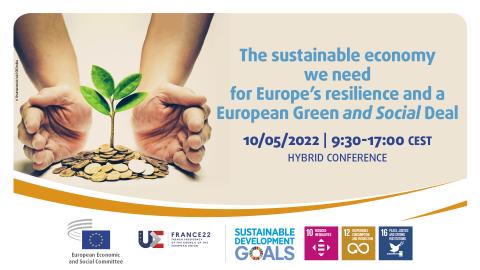European Economic
and Social Committee
The sustainable economy we need for Europe's resilience and a European Green and Social Deal
Scope and objectives
On 10 May, the European Economic and Social Committee and the French Presidency of the Council of the EU will host a conference, bringing together EU policy makers to lay the groundwork for discussing a new policy framework for a sustainable economy for the wellbeing of society as driver for Europe's resilience and strategic autonomy, focusing on systemic change.
Invited speakers will:
- present examples of existing initiatives and good practice in implementing sustainable economic models (such as so called wellbeing economy, Doughnut economics, etc.) from EU Member States and the private sector.
- discuss the challenges and obstacles to scaling up existing initiatives on the sustainable economy, and the main drivers to gear the change, addressing the importance of circular economy as an opportunity to reduce dependencies on raw materials and enhance strategic autonomy.
- explore concrete ways and steps, including economic governance reforms, needed to achieve a sustainable and resilient economy at EU level in the context of a European Green and Social Deal, while distinguishing short-term, medium-term and long-term steps.
Taking place in the year of the 50th anniversary of the publication of the Club of Rome report on "The Limits of Growth" this conference will lead-up to the Stockholm+50 conference "A healthy planet for the prosperity of all". It will also contribute to one of the French Presidency's priorities to promote "A new European model for growth": to make Europe a land in which economic development is aligned with climate goals; that supports innovation and the growth of European digital players and sets its own rules for the digital world; and that offers high-quality, high-skilled and better-paying jobs.
This event is organised in collaboration with the European Parliament, feeding into the EP's 2023 conference on "Beyond Growth - Pathways towards Sustainable Prosperity in the EU" and will involve a large number of civil society actors, think tanks and other organisations actively promoting an economy of well-being such as the OECD, the Club of Rome, ZOE Institute, IEEP, Oxfam, environmental and youth organisations, etc.
No registration is required. The event will be webstreamed on the EESC's dedicated webpage, save the date in your agenda and watch it live! Interpretation will be available into EN, FR and DE and viewers will have the opportunity to engage in the debate using the platform Slido, with the code #SustainableEconomy.
Context
Amid the tragic effects of the Ukrainian war and the global COVID-19 pandemic, we are witnessing the most severe humanitarian, economic, environmental and social challenges since decades. While strongly condemning the unilateral aggression against Ukraine and tackling its tragic social, economic and environmental consequences, addressing the impacts of the war should not come to the detriment of climate action and sustainability, as provided for in the UN Agenda 2030 on sustainable development, which is, first and foremost, an agenda of peace, security and poverty reduction[1].
In the short term, measures will be necessary to limit our dependencies in energy, critical raw materials and food, address energy poverty and strengthen Europe's strategic autonomy in the energy and food sector and beyond. It is important to maintain solidarity and further develop common European responses to share the burden of the economic impact and to prioritise public investment towards enhancing the resilience of the EU economy, while preserving debt sustainability. In the long term, progress towards implementation of the UN Agenda 2030 and a just transition, through the European Green Deal, must continue and only exceptional derogations can be granted for a limited time as we are still in a climate emergency.
The momentum to move towards the next stage of more sustainable development in the EU has been achieved by the European Green Deal and its various components. However, for sustainable development to truly become the guiding principle of a European Green and Social Deal and the EU’s recovery, it is now necessary to move up a gear in the implementation of the Sustainable Development Goals (SDGs) through EU policies. One essential step is to reform the current economic model beyond GDP-based growth and to promote an overall policy framework for a sustainable economy for the wellbeing of society - an objective reflected in the 8th Environment Action Programme (EAP). This objective has just been agreed by the co-legislators, who state that "by 2050 at the latest, people (shall) live well, within the planetary boundaries in a well-being economy where nothing is wasted, growth is regenerative, climate neutrality in the Union has been achieved and inequalities have been significantly reduced".
To ensure this transition, the Union will have to develop a more holistic approach to policymaking through, among other things, the use of a summary dashboard that measures economic, social and environmental progress 'beyond GDP', ultimately serving as a political summary to guide policymaking.
Do you have a question?Contact us!
